 |
To the left, Martin's pickup hotel, Rivera de
Goa.
The nice garden of the hotel. |
 |
 |
Martin and his jeep. We were 5 persons in each
plus the driver. Then off to other hotels. Building is
happening everywhere in Goa, even in this financial crisis. |
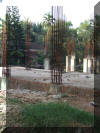 |
 |
Hay bales on top of young Indian women going
about their daily toil. People are everywhere. That is
India's curse. Too many mouths to feed. Over 1,1 billion these days. |
 |
 |
Traveling along the Madovi river, we watched a
lot of these fishing boats. A closer look on the bricks of
Goa. It is actually soft iron rock cut out of the ground. The iron is giving
the rocks its red looks. |
 |
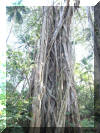 |
The Banyon tree. A sacred tree for the Indians.
Local women doing the washing in a local creek, chatting and exchanging
gossips as they going about it. |
 |
 |
A small dam regulating the river.
A local grocery store. Supermarkets in Western sense are not common in
India. |
 |
 |
The local pub was out of beers. Only hard tack
left. The backyard of the local baker. Not to healthy, but
then the oven killed most of the germs. |
 |
![]() |
Drying fish by just putting it out into the sun,
even on roads.
The local fishing boats. Doesn't look too safe and the
fishermen cannot swim. |
 |
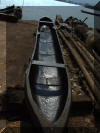 |
A close-up of one of the boats newly made.
The primary school of the local town. The pupils have left their footwear
outside the classrooms. |
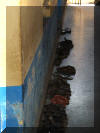 |
 |
The name of the school. The children get one
meal a day. In so doing, the Government saves the families for one meal. It
encourages school going. At the age of 10, the teaching starts in English.
Many Indians speak English to their children from they are born to help them
learn English. The river of Madovi. |
 |
 |
As an additional business, the ladies of the
village makes hemp ropes from coconuts. Martin in the
middle. |
 |
 |
First the hemp fibers are soaked for 3-4 days,
then dried for 2 days in the sun and then beaten before use.
Then it is twisted by the ladies. |
 |
 |
The ladies seen here. In each
end it was a bicycle wheel doing the twisting. |
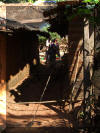 |
 |
A very simple and effective way to do things and
a nice additional income for the families.
Then we crossed the river with a local ferry boat. |
 |
 |
The big V12 driving the ferry. A
loading ramp for iron ore. |
 |
 |
Martin and one of the locals on the boat.
The trapdoor in front of the ferry. |
 |
 |
A luxury house next to the river.
Meeting the sister ferry half way across the river. |
 |
 |
The big barges taking iron ore out to the big
ocean going transports bringing it to the destinations in Japan and China.
Ready to unload the ferry. |
 |
 |
A pottery maker reading his wheel for the day.
Putting a lump of clay on the wheel and getting ready for business. |
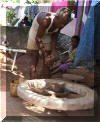 |
 |
The finished results ready for sale.
The Toddy collector. Toddy is the juice coming from the palm tree's leaves
when you cut it out. |
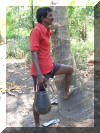 |
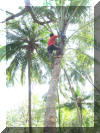 |
Way up in the palm. The Toddy is
actually quite good tasting and used for special cool drinks and the local
hardtack, Fenji. |
 |
 |
The still that makes the fenji.
The finished product is for sale. € 1,- for a small bottle is OK. |
 |
 |
Time for lunch. One big, fat Mama from Norway
read to gorge herself. Then off from this nice Indian home
that hosted us. |
 |
 |
A trip to Velsao Beach. The season hadn't
started yet. Nice, white beaches, but the undercurrents
could be bad. |
 |
 |
To the left, the unopened beaches of Goa. The life guards
are on duty already.
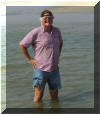
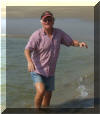

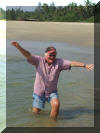
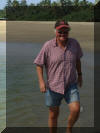
Martin having a bash at the sea. Since he forgot his swimming trunks, he
just had to wade.
The Norwegian lady that took the pictures above and her
dyke friend playing in the water. |
 |
 |
Endless beaches on the South Coast of Goa.
Goa have a rail road crossing the country from North to South. |
 |
 |
Strait rails as far as the eye could see.
More rails. |
 |
|
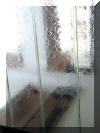 |
Back to the Riviera Hotel to wait for Daya's
pickup. Here is the hotel's guardsman helping Martin into
his transport. Daya has gotten a new car for this season. |
 |
